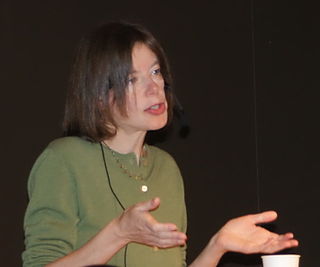
Susan Charlotte Faludi is an American feminist, journalist, and author. She won a Pulitzer Prize for Explanatory Journalism in 1991, for a report on the leveraged buyout of Safeway Stores, Inc., a report that the Pulitzer Prize committee commended for depicting the "human costs of high finance". She was also awarded the Kirkus Prize in 2016 for In the Darkroom, which was also a finalist for the 2017 Pulitzer Prize in biography.

Simone Lucie Ernestine Marie Bertrand de Beauvoir was a French existentialist philosopher, writer, social theorist, and feminist activist. Though she did not consider herself a philosopher, nor was she considered one at the time of her death, she had a significant influence on both feminist existentialism and feminist theory.

Doris May Lessing was a British-Zimbabwean novelist. She was born to British parents in Iran, where she lived until 1925. Her family then moved to Southern Rhodesia, where she remained until moving in 1949 to London, England. Her novels include The Grass Is Singing (1950), the sequence of five novels collectively called Children of Violence (1952–1969), The Golden Notebook (1962), The Good Terrorist (1985), and five novels collectively known as Canopus in Argos: Archives (1979–1983).

Katie Roiphe is an American author and journalist. She is best known as the author of the non-fiction book The Morning After: Sex, Fear, and Feminism on Campus (1993). She is also the author of Last Night in Paradise: Sex and Morals at the Century's End (1997), and the 2007 study of writers and marriage, Uncommon Arrangements. Her 2001 novel Still She Haunts Me is an imagining of the relationship between Charles Dodgson and Alice Liddell, the real-life model for Dodgson's Alice's Adventures in Wonderland. She is also known for allegedly planning to name the creator of the Shitty Media Men list in an article for Harper's Magazine.
Sex-positive feminism, also known as pro-sex feminism, sex-radical feminism, or sexually liberal feminism, is a feminist movement centering on the idea that sexual freedom is an essential component of women's freedom. They oppose legal or social efforts to control sexual activities between consenting adults, whether they are initiated by the government, other feminists, opponents of feminism, or any other institution. They embrace sexual minority groups, endorsing the value of coalition-building with marginalized groups. Sex-positive feminism is connected with the sex-positive movement. Sex-positive feminism brings together anti-censorship activists, LGBT activists, feminist scholars, producers of pornography and erotica, among others. Sex-positive feminists generally agree that prostitutes themselves should not be criminalized.
John Stoltenberg is an American author, activist, magazine editor, college lecturer, playwright, and theater reviewer who identifies his political perspective as radical feminist. For several years he has worked for DC Metro Theater Arts and as of 2019 is its executive editor. He has written three books, two collections of his essays and a novel. He was the life partner of Andrea Dworkin for 30 years and has lived with his husband, Joe Hamilton, for over 15 years.
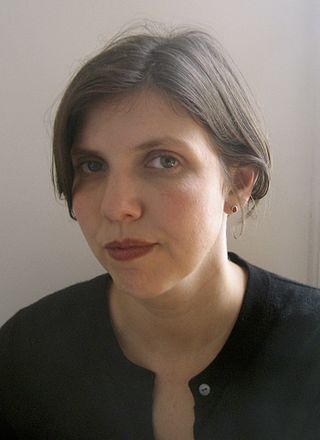
Jenny Offill is an American novelist and editor. Her novel Dept. of Speculation was named one of "The 10 Best Books of 2014" by The New York Times Book Review.

Jenny Diski FRSL was an English writer. She had a troubled childhood, but was taken in and mentored by the novelist Doris Lessing; she lived in Lessing's house for four years. Diski was educated at University College London, and worked as a teacher during the 1970s and early 1980s.
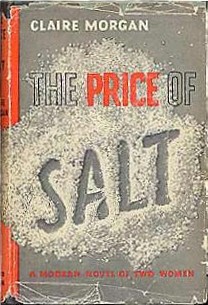
The Price of Salt is a 1952 romance novel by Patricia Highsmith, first published under the pseudonym "Claire Morgan." Highsmith—known as a suspense writer based on her psychological thriller Strangers on a Train—used an alias as she did not want to be tagged as "a lesbian-book writer", and she also used her own life references for characters and occurrences in the story.
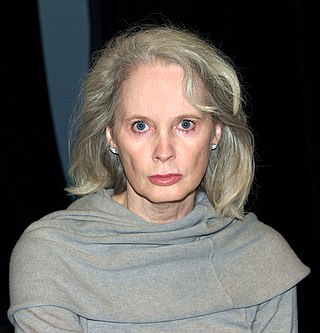
Mary Gaitskill is an American novelist, essayist, and short story writer. Her work has appeared in The New Yorker, Harper's Magazine, Esquire, The Best American Short Stories, and The O. Henry Prize Stories. Her books include the short story collection Bad Behavior (1988) and Veronica (2005), which was nominated for both the National Book Award for Fiction and the National Book Critics Circle Award for Fiction.

The Memoirs of a Survivor is a dystopian novel by Nobel Prize-winner Doris Lessing. It was first published in 1974 by Octagon Press. It was made into a film in 1981, starring Julie Christie and Nigel Hawthorne, and directed by David Gladwell.
Sheila Jeffreys is a former professor of political science at the University of Melbourne, born in England. A lesbian feminist scholar, she analyses the history and politics of human sexuality.
Lisa Jervis is an American writer, editor, publisher, and information technology professional. She is one of the founding editors and publisher of Bitch Magazine, established in 1996.
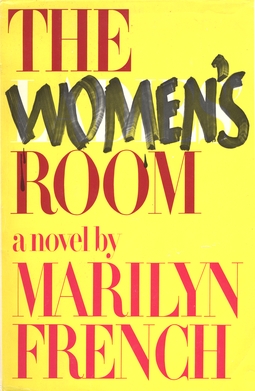
The Women's Room is the debut novel by American feminist author Marilyn French, published in 1977. It launched French as a major participant in the feminist movement and, while French states it is not autobiographical, the book reflects many autobiographical elements. For example, French, like the main character, Mira, was married and divorced, and then attended Harvard where she obtained a Ph.D. in English Literature. Despite the connection of The Women's Room to the feminist movement, French stated in a 1977 interview with The New York Times: "The Women's Room is not about the women's movement … but about women's lives today."

The Sweet Dove Died is a novel by Barbara Pym, first published in 1978. The title is a quotation from a poem, "I Had a Dove", by John Keats.
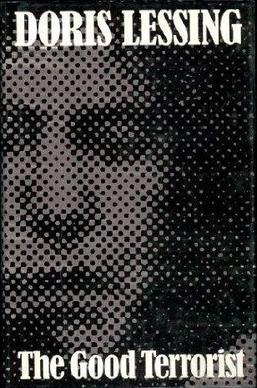
The Good Terrorist is a 1985 political novel written by the British novelist Doris Lessing. The book's protagonist is the naïve drifter Alice, who squats with a group of radicals in London and is drawn into their terrorist activities.

Mating (1991) is a novel by American author Norman Rush. It is a first-person narrative by an unnamed American anthropology graduate student in Botswana around 1980. It focuses on her relationship with Nelson Denoon, a controversial American social scientist who has founded an experimental matriarchal village in the Kalahari desert.
Feminist views on sexuality widely vary. Many feminists, particularly radical feminists, are highly critical of what they see as sexual objectification and sexual exploitation in the media and society. Radical feminists are often opposed to the sex industry, including opposition to prostitution and pornography. Other feminists define themselves as sex-positive feminists and believe that a wide variety of expressions of female sexuality can be empowering to women when they are freely chosen. Some feminists support efforts to reform the sex industry to become less sexist, such as the feminist pornography movement.
Feminist children's literature is the writing of children's literature through a feminist lens. Children's literature and women's literature have many similarities. Both often deal with being seen as weak and placed towards the bottom of a hierarchy. In this way feminist ideas are regularly found in the structure of children's literature. Feminist criticism of children's literature is therefore expected, since it is a type of feminist literature. Feminist children's literature has played a critical role for the feminist movement, especially in the past half century. In her book Feminism Is for Everybody: Passionate Politics, bell hooks states her belief that all types of media, including writing and children's books, need to promote feminist ideals. She argues "Children's literature is one of the most crucial sites for feminist education for critical consciousness precisely because beliefs and identities are still being formed". The cover of hooks' book, drawn by Laura DeSantis, depicts children alongside adults, showing the importance of the youth. The presence of feminism in children's literature has evolved over the years, but the overall message and goals have remained consistent.

This One Summer is a graphic novel written by Mariko Tamaki and illustrated by Jillian Tamaki published by First Second Books in 2014. It is a coming of age story about two teenage friends, Rose and Windy, during a summer in Awago, a small beach town. Rose and Windy discover themselves and their sexuality while battling family dynamics and mental disabilities.













